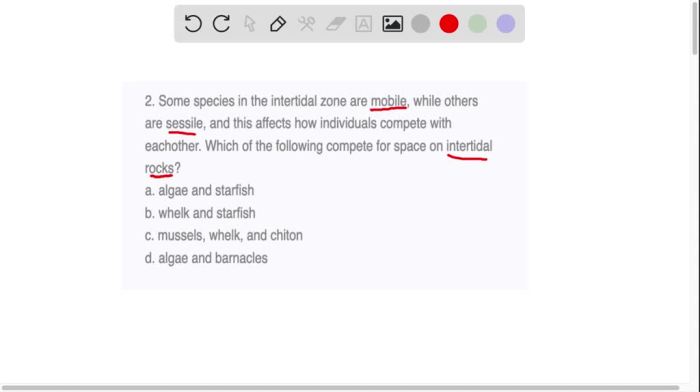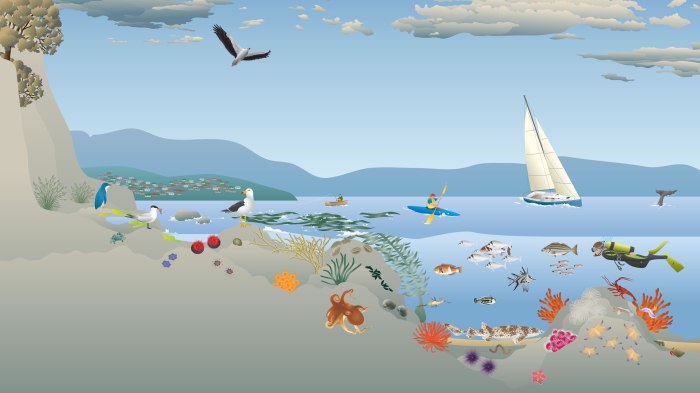Recall that some species in the intertidal zone, the dynamic region between high and low tides, possess remarkable abilities to remember and retrieve information. This cognitive capacity plays a crucial role in their survival and adaptation to the ever-changing intertidal environment.
Intertidal zone species exhibit diverse recall mechanisms, ranging from behavioral adaptations to neural adaptations. These mechanisms enable them to remember spatial locations, food sources, predators, and social interactions. Memory and recall are essential for these species to navigate the challenges of the intertidal zone, such as fluctuating tides, extreme temperature variations, and predation.
Intertidal Zone Species: Recall That Some Species In The Intertidal Zone

The intertidal zone is the area of the shoreline that is alternately covered and uncovered by the tide. It is a harsh environment, with species having to adapt to extreme changes in temperature, salinity, and wave action. Some of the species that inhabit the intertidal zone include:
- Barnacles
- Mussels
- Limpets
- Sea urchins
- Starfish
These species have evolved a variety of adaptations that allow them to survive in the intertidal zone. These adaptations include:
- A strong attachment to the substrate
- A thick shell or exoskeleton
- The ability to store water
- The ability to tolerate extreme temperatures
Species Recall
Species in the intertidal zone have evolved a variety of ways to recall information. This information can be used to help them find food, avoid predators, and navigate their environment.
- One way that species in the intertidal zone recall information is through associative learning. This type of learning involves linking two stimuli together. For example, a sea urchin may learn to associate the smell of food with the presence of food.
- Another way that species in the intertidal zone recall information is through spatial memory. This type of memory involves remembering the location of objects in space. For example, a limpet may remember the location of its home.
Memory and recall are essential for survival in the intertidal zone. They allow species to learn from their experiences and to adapt to the changing environment.
Behavioral Adaptations
In addition to physiological adaptations, species in the intertidal zone have also evolved a variety of behavioral adaptations that enhance recall. These adaptations include:
- Caching: Some species, such as sea urchins, cache food in order to remember its location.
- Site fidelity: Some species, such as limpets, return to the same location day after day. This behavior helps them to remember the location of their home and food sources.
- Exploration: Some species, such as starfish, actively explore their environment in order to learn about new food sources and potential predators.
These behavioral adaptations play an important role in the survival and fitness of species in the intertidal zone.
Neural Mechanisms, Recall that some species in the intertidal zone
The neural mechanisms that support recall in intertidal zone species are still not fully understood. However, research has shown that these species have a number of brain structures that are involved in memory and learning.
One of the most important brain structures involved in recall is the hippocampus. The hippocampus is a region of the brain that is responsible for forming and storing memories. In intertidal zone species, the hippocampus is relatively large, which suggests that it plays an important role in their ability to recall information.
Another brain structure that is involved in recall is the amygdala. The amygdala is a region of the brain that is responsible for processing emotions. In intertidal zone species, the amygdala is thought to play a role in linking emotional experiences to memories.
Research on the neural mechanisms of recall in intertidal zone species is still in its early stages. However, this research is providing valuable insights into the evolution of memory and learning.
Ecological Implications
Recall has a number of important ecological implications for species in the intertidal zone. For example, recall allows species to:
- Find food
- Avoid predators
- Navigate their environment
- Interact with other species
Recall is also thought to play a role in the structure and dynamics of intertidal zone communities. For example, species that have a good memory for the location of food sources are more likely to survive and reproduce. This can lead to the formation of dense aggregations of species in areas with high food availability.
Overall, recall is an essential cognitive ability for species in the intertidal zone. It allows them to learn from their experiences and to adapt to the changing environment.
Question Bank
How do intertidal zone species recall information?
Intertidal zone species recall information through various mechanisms, including behavioral adaptations (e.g., spatial memory, food caching) and neural adaptations (e.g., neural plasticity, long-term potentiation).
Why is recall important for intertidal zone species?
Recall is crucial for intertidal zone species to navigate the challenges of their environment, such as fluctuating tides, extreme temperature variations, and predation. It enables them to remember spatial locations, food sources, predators, and social interactions.
What are some potential mechanisms that allow intertidal zone species to recall information?
Potential mechanisms include neural plasticity, long-term potentiation, spatial memory formation, and associative learning.

